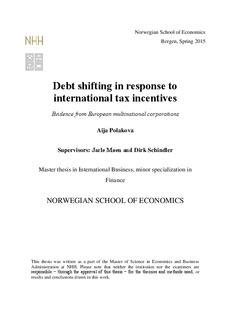| dc.description.abstract | This study examines whether national and international tax factors can explain
leverage decisions of European multinational corporations. Using the model specification
proposed by Møen, Schindler, Schjelderup and Tropina (2011), the study predicts that an
affiliate’s leverage depends on host country statutory corporate tax rate and differences
between host country tax rate and foreign tax rates. Differences in international tax rates
influence international debt shifting whose main idea is claiming interest income in low-tax
countries and interest expenses in high-tax countries. Predictions of the model form the basis
of my main research question and sub-questions, which are tested on a data sample of
European multinational firms and their majority-owned subsidiaries, obtained from firmlevel
Amadeus database. Historical ownership data on majority-owned subsidiaries of
European multinational firms is initially obtained from firm-level Orbis database. The
obtained results show that an affiliate’s financial structure depends on three tax mechanisms:
host country corporate tax rate, external debt shifting mechanism and internal debt shifting
mechanism. Due to correlation between the tax mechanisms, omission of any of them from
the specification would bias the estimated effect on affiliate’s leverage of the other tax
mechanisms that are included in the specification. Assuming a constant historical ownership
structure over the sample period would result in misclassified subsidiary-parent relations and
a subsequent downward bias in the estimated effect of international debt shifting mechanisms
on affiliate’s leverage. Hence, adjustments to historical ownership structure changes are
necessary to obtain unbiased estimates of variables that are measured based on data on all
affiliates within the multinational group. Finally, European multinational corporations with
majority-owned affiliates outside Europe must also be considered carefully. Capital
structures of European affiliates which belong to these multinational corporations seem to be
less responsive to international tax incentives. This finding can be explained by measurement
errors in the international debt shifting mechanisms that arise due to disregarding financial
and tax data on affiliates outside Europe that belong to the multinational group. | nb_NO |
